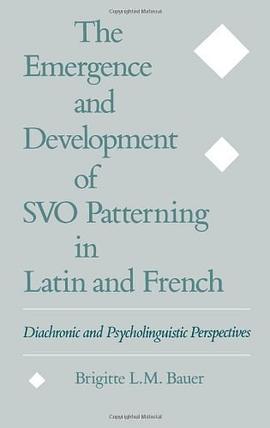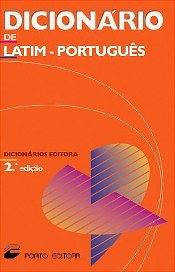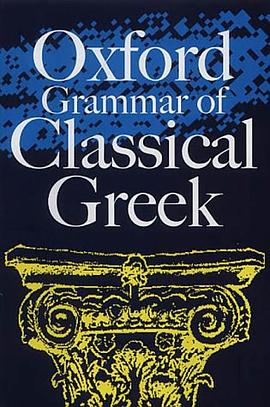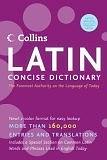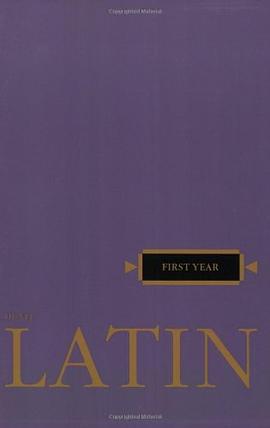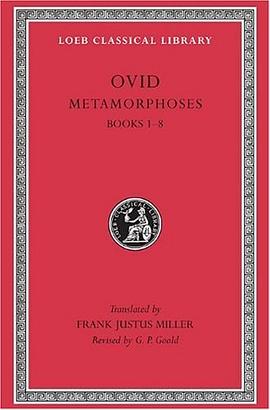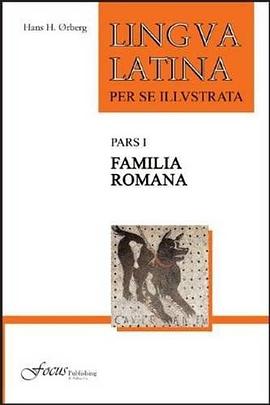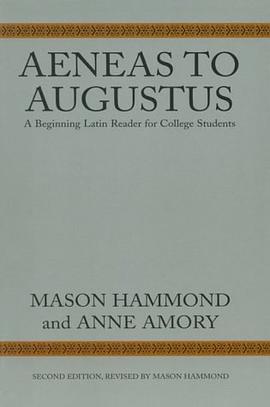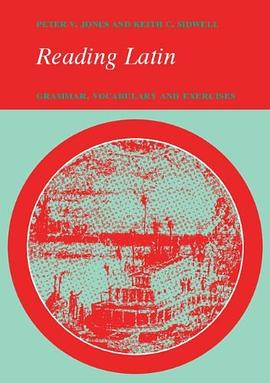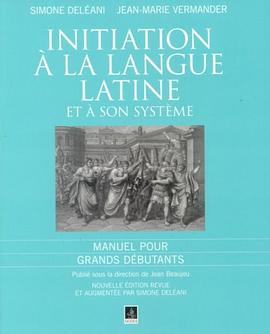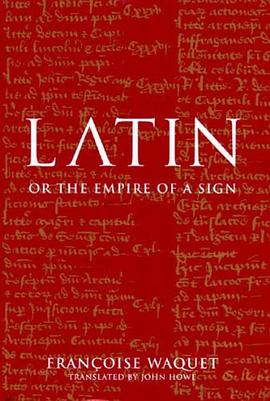

具体描述
This is a history of Latin between the 16th and 20th centuries, a period when the language dominated the civic and sacred worlds of Europe and, arguably, the entire Western world. The book explores the institutional contexts in which the language was adopted and transmitted, as well as the privilege it came to confer on those that studied it. Waquet demonstrates how Latin became a symbol of status and ultimately shows that, rather than disappearing, this has given way to a nostalgic exoticism such that water companies and car models now use Latin names. This is a work of reference, but it is also a cultural history, detailing the power struggles that took place in education and the world of science over Latin's status.
作者简介
Francoise Waquet is a director of research at the Centre National de la Recherche Scientifique in Paris. Among her previous books are Les fetes royales sous la Restauration ou l'Ancien Regime retrouve and, with Hans Bots, La Republique des Lettres.
目录信息
读后感
没有对照原文仔细看译文,只是随手记下碰到的一些小错。 第13页:Tacites,当作“塔西陀”。又见43页。 第18页:France,当作“法朗士”。 第29/31页:《耕作的艺术》,当作“农事诗”。又见43页。 33页:Gousaz,当写作Crousaz。 35页:le gerontif没有译对。 39页:小标题译...
评分“拉丁文勾勒出无知者的巴别塔和学者的一元化社会之间的分野。”欧洲文化史专家弗朗索瓦·瓦克此言,足以窥见拉丁文自带的优越感。一种死语言,在失去了其主宰地位数百年后依然占据人们视野,当然不只基于实用性,《拉丁文帝国》一书由此而来。 瓦克由拉丁文盛衰史展开,拥趸...
评分世界上有很多种语言,其纷繁变化超乎人们的想象。每隔一段时间,就有一种语言无声无息地消失。像拉丁文这样历史悠久、影响深远、地位特殊的语种,它为何在如今成了一种渐趋没落的“死语言”呢?这是一个值得探究的问题。 知其果,究其因。法国文化学者弗朗索瓦•瓦克...
评分 评分曾经欧洲存在1500多年的拉丁语,据悉只有梵蒂冈使用。它曾影响着西方的文化、学术、印刷等将近2000多年,但在现代世界几乎消失,到底是什么使这样悠久的语言衰落,《拉丁文帝国》将恢复一个古老的语言王国,重现拉丁文的兴衰。 作者法国作家弗朗索瓦•瓦克,法国国家科学研...
用户评价
在翻开《Latin》之前,我内心深处怀揣着一种近乎朝圣般的敬畏,也掺杂着一丝近乎恐惧的未知。毕竟,“Latin”这个词本身就承载了太多历史的厚重、文明的源头、以及无数学者穷尽一生也未能完全参透的奥秘。我并非语言学家,也不是古典学领域的专家,我只是一个对人类文明的根脉充满好奇的普通读者。我希望通过这本书,能够窥探到古罗马的灵魂,触摸到那个时代鲜活的人们是如何思考、感受、并用那凝练而优美的语言来表达他们的喜怒哀乐。这本书在我手中,仿佛成了一扇通往遥远时空的窗户,我迫不及待地想看看窗外会展现出怎样的景象。我期待着它能为我打开一扇新的认知大门,让我不再仅仅把拉丁语视为一种“死去的语言”,而是能感受到它在历史长河中流淌的力量,以及它如何塑造了我们今天所熟知的许多概念、词汇和思维方式。我希望这本书不仅仅是枯燥的语法讲解和词汇罗列,而是能够在我脑海中勾勒出一幅幅生动的画面,让我仿佛置身于罗马广场,听到辩论的声音,感受到角斗场的嘶喊,甚至品尝到古罗马宴会的盛宴。我希望它能是一次令人振奋的思想之旅,一次触及文明深处的探索。
评分当我捧起《Latin》这本书时,我脑海中浮现的不仅仅是单词和语法,更是那些在历史长河中闪耀的名字:凯撒、西塞罗、奥古斯都、圣奥古斯丁…… 他们用拉丁语书写了属于他们的时代,留下了永垂不朽的篇章。我希望这本书能够帮助我理解,是什么样的语言,能够承载如此深厚的思想和如此辉煌的文明?它是否有一种独特的韵律和结构,能够让思想更加清晰,情感更加浓烈?我渴望在这本书中找到答案,不仅仅是关于语言本身的知识,更是关于这种语言所代表的思维方式和文化基因。我希望它能让我体会到拉丁语的严谨和精确,那种一丝不苟的逻辑,那种对概念的清晰界定,我相信这是古罗马人在科学、法律和哲学领域取得辉煌成就的重要原因之一。同时,我也期待它能展现出拉丁语的优雅和力量,那种在诗歌中流淌出的韵律,那种在演讲中激荡出的豪情。这本书,对我而言,是一次与伟大的灵魂对话的机会,一次重温人类智慧源头的契机。
评分总而言之,《Latin》这本书在我心中,不仅仅是一本语言学习的书籍,更是一部承载着人类文明厚重历史的史书,是一扇通往古罗马智慧殿堂的窗户。我期待着在翻阅这本书的过程中,能够感受到古罗马人那种对知识的渴求,对真理的探索,以及对语言的精雕细琢。我希望它能够用一种引人入胜的方式,为我展现拉丁语的魅力,它那严谨的逻辑,优雅的韵律,以及它在塑造西方文明过程中的核心作用。我希望这本书能够让我不再视拉丁语为一种遥远的、难以企及的语言,而是能够感受到它与我们当下生活的紧密联系,感受到它所蕴含的智慧和力量。这是一次精神的洗礼,一次对人类文明源头的追溯,一次让我能够更深刻地理解世界和自身的旅程。
评分每次看到那些源自拉丁语的现代词汇,我都会感到一种奇妙的联结感,仿佛看到了文明传承的痕迹。《Latin》这本书,对我来说,就是一次深入探究这种联结的旅程。我希望它能够帮助我理解,拉丁语是如何渗透到我们的日常语言中的,那些我们习以为常的词汇,背后竟然有着如此悠久的历史和深刻的内涵。我期待书中能够对一些关键的拉丁语词汇和短语进行深入的解读,揭示它们在古代的用法和含义,以及它们是如何演变并影响现代语言的。我希望它能让我看到,拉丁语不仅仅是一种“死去的语言”,它依然以各种各样的方式,活跃在我们周围。这本书,对我而言,是一次重新认识我们自身语言根源的机会,一次揭示隐藏在熟悉事物背后的深层联系的探索。
评分我一直坚信,语言是思想的容器。而拉丁语,作为塑造了西方哲学、法律、科学等众多领域基石的语言,它所承载的思想深度和逻辑严谨性,是毋庸置疑的。《Latin》这本书,在我眼中,是通往这片思想海洋的一艘小船。我希望它能够带领我,不仅仅是学习它的拼写和发音,更是去理解它独特的逻辑结构和思维方式。我期待书中能够深入分析拉丁语的句子构成,它如何通过严谨的词序和丰富的格变化来精确表达意义,这种精确性是如何影响了科学的定义和法律的条文。我希望它能够让我看到,拉丁语的“严谨”和“精确”是如何体现在其词汇的形成和概念的定义上的,这对我理解西方理性主义思维的起源至关重要。这本书,对我来说,是一次对人类理性思维的一次深度挖掘。
评分坦白说,我对拉丁语的了解仅限于一些零星的词汇和短语,比如“carpe diem”或者“almamater”。我购买《Latin》这本书,是怀揣着一种想要系统性地了解这门古老语言的愿望。我希望它能够像一位循循善诱的老师,将我从对拉丁语的一无所知,一步步引向对它的理解和欣赏。我期望这本书能在我脑海中构建起一个清晰的拉丁语学习框架,从最基础的发音和字母开始,然后是名词的变格,动词的变位,句子的构成,再到更复杂的修辞手法和文学风格。我希望它能够提供丰富的例句,让我看到这些规则是如何在实际语境中应用的,而不是仅仅停留在抽象的概念上。我更期待它能让我感受到拉丁语的魅力,它不仅仅是枯燥的符号,更是承载着古罗马人民智慧和情感的载体。希望这本书能让我领略到拉丁语独特的逻辑性和表现力,并从中获得学习的乐趣和成就感。
评分这本书在我指尖流淌,仿佛带着一股古老而醇厚的酒香,又像是拂过面颊的微风,带着地中海的阳光和历史的尘埃。我一直觉得,学习一门古老的语言,不仅仅是为了掌握一套规则,更是为了走进那个语言诞生之初的那个世界,去理解他们的价值观,他们的哲学,他们的艺术,他们的生活方式。我希望《Latin》能带我踏上这样一段旅程,让我不仅仅是认识到“venimus, vidimus, vicimus”的豪迈,更能体会到荷马史诗中史诗般的悲壮,维吉尔史诗中对家园和命运的眷恋,奥维德诗歌中对爱情和变形的迷恋。我期望书中能够展现出拉丁语的生命力,它如何在不同的历史时期和地域焕发出不同的光彩,又是如何潜移默化地影响着后世的文学、法律、科学和宗教。我希望它能让我感受到,那些古罗马的哲学家们是如何通过严谨的逻辑思考来构建他们的理论,那些雄辩家们又是如何用华丽的辞藻来征服听众。这本书,在我心中,不仅仅是一本工具书,更是一部承载着人类集体记忆的宝库,我期待着它能为我揭示出其中蕴含的智慧和美。
评分我总是觉得,一个民族的语言,是他们思维方式的直接体现。而拉丁语,作为西方文明的重要源头之一,它所蕴含的逻辑、结构和表达方式,无疑对后世产生了深远的影响。我希望《Latin》这本书能够带我深入探究拉丁语的精髓,让我不仅仅是学习它的语法和词汇,更是理解它背后所承载的思维模式。我期待书中能够详细解析拉丁语的句子结构,比如它严谨的格位系统是如何影响语序的自由度,又是如何让意思表达得更加精确。我也希望它能够探讨拉丁语的词汇构成,那些由词根、词缀组成的复杂单词,是如何体现出古罗马人丰富的联想能力和逻辑推理能力的。我希望通过这本书,能够窥探到古罗马人看待世界的方式,他们的理性精神,他们的逻辑思维,以及他们对精确性的极致追求。这对我来说,是一次理解西方文明思维根源的宝贵机会。
评分阅读《Latin》的过程,对我来说,更像是一次考古探险,只不过这次挖掘的对象不是物质遗迹,而是语言的宝藏。我一直觉得,学习一门古老的语言,就像是获得了一把能够打开历史尘封之门的钥匙。我希望这本书能够为我提供这种钥匙,让我不仅仅是看到那些被翻译过来的文本,而是能够直接去触摸那些原始的文字,去感受它们在诞生之初的韵味。我期待书中能够详细解析拉丁语的语法结构,那些复杂的变格和变位,表面上看起来令人望而生畏,但我相信它们背后隐藏着深刻的逻辑和表达的精妙之处。我希望这本书能够用清晰易懂的方式,引导我理解这些规则,并让我看到,这些规则是如何让拉丁语能够以如此凝练而又丰富的形式来表达思想的。我希望它能让我感受到,学习拉丁语的过程,本身就是一次智力上的挑战和乐趣。
评分当我决定拿起《Latin》这本书时,我内心深处是对某种失落的文明的追溯。我总觉得,有些东西,随着时间的流逝而褪色,但有些东西,却因为它的坚韧和深刻,而得以永存。拉丁语,无疑就是后者。我希望这本书能让我感受到,拉丁语并非是那种冰冷、僵化的语言,而是充满生命力的。我期待它能展现出拉丁语的诗意,它在文学作品中是如何描绘出细腻的情感,壮丽的景象,深刻的哲理。我希望它能让我体会到拉丁语的韵律感,那种在朗读时能感受到其节奏和音美的神奇之处。我更希望它能让我理解,为什么这样一门语言,能够在数千年后仍然对我们产生如此巨大的影响,它在科学、法律、哲学、医学等领域所扮演的角色。这本书,在我看来,是一座连接过去与现在的桥梁,我迫不及待地想通过它,去感受那些被时间沉淀下来的珍贵财富。
评分 评分 评分 评分 评分相关图书
本站所有内容均为互联网搜索引擎提供的公开搜索信息,本站不存储任何数据与内容,任何内容与数据均与本站无关,如有需要请联系相关搜索引擎包括但不限于百度,google,bing,sogou 等
© 2026 book.quotespace.org All Rights Reserved. 小美书屋 版权所有

